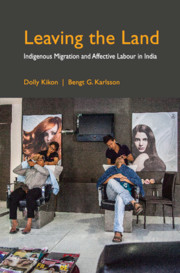3 - Departures and Returns
Published online by Cambridge University Press: 04 May 2019
Summary
When he wasn't looking, Barisha slipped rice into his bag. A small plastic container of red-husked uncooked grain that he probably wouldn't notice on his travels. If it was nothing she could do to keep him from leaving, perhaps this would somehow bring him back. Every time she left Shillong, her mother would do the same – ‘to always bring you home safely’. It was what the Khasis believed, that rice, commonplace and ordinary, carried the power of the earth where it was grown, and would lead you back to where you belonged.
– Janice Pariat, Boats on Land, 2012The author, Janice Pariat, describes beautifully in one of her short stories how the young Khasi woman Barisha seeks to make her lover eventually return when he sets out on an uncertain journey to seek out his family's past. Barisha, like her boyfriend, is from the colonial hill resort of Shillong, today capital of the hill state Meghalaya. While she belongs to the indigenous Khasi community, her boyfriend is Jewish and his family ended up there after fleeing persecution in Nazi Germany. The opening scene, quoted above, takes place in the south Delhi neighbourhood where, like many other migrants from Northeast India, they have taken temporary accommodation. Looking out from the balcony, Barisha thinks about them (her fellow migrants from the Northeast) as ‘perpetual pilgrims… always journeying elsewhere’ (Pariat 2012: 168).
Pariat's story takes us to the heart of the matter of this book – young people from Northeast India travelling out in the world, some to return and others to seek out yet other places, on a journey seemingly without a fixed end-station. In this chapter, we address various matters relating to such mobility, that is, ‘wayfinding’ – what it is to leave, how one stays in touch with people at home, how to balance individual desires with expectations from the family, kin, and community, and what it is to return or the hope or fear to do so. While the stories vary greatly, the focus in this chapter is on the indigenous youths who hail from a city or small town and who mainly leave home to pursue higher studies.
- Type
- Chapter
- Information
- Leaving the LandIndigenous Migration and Affective Labour in India, pp. 60 - 82Publisher: Cambridge University PressPrint publication year: 2019

